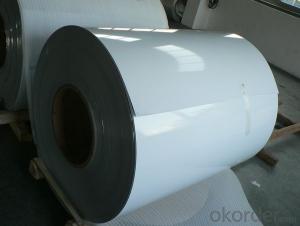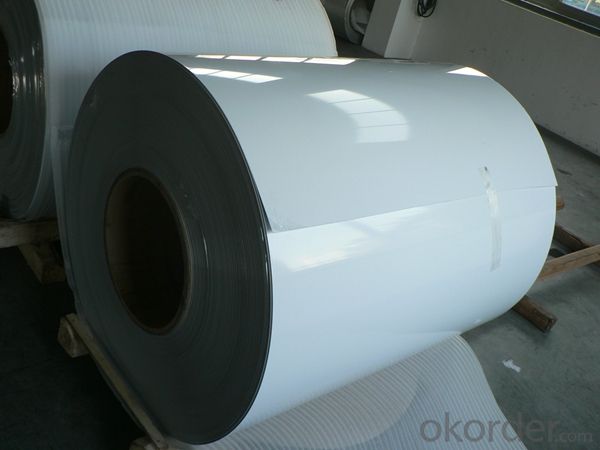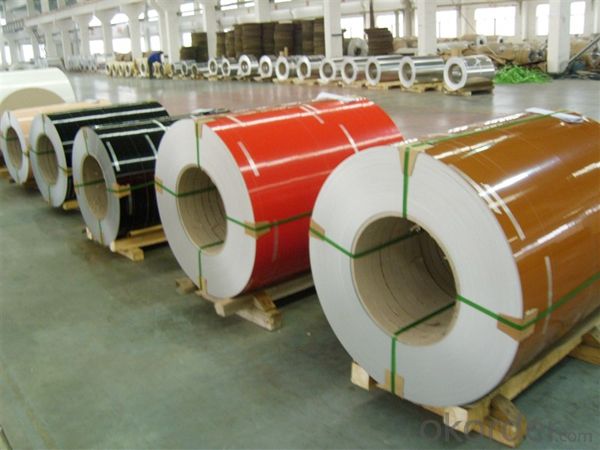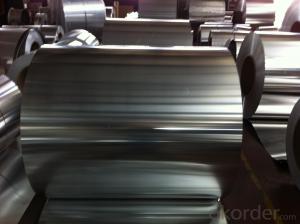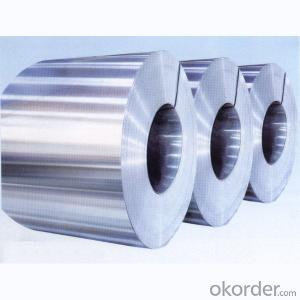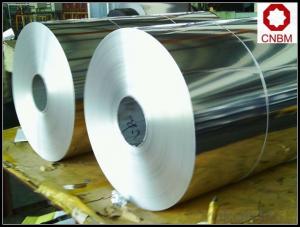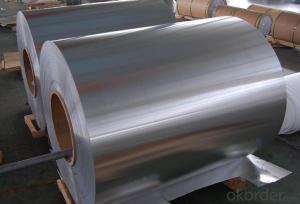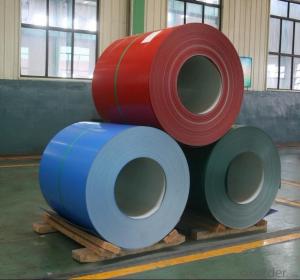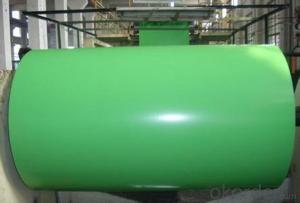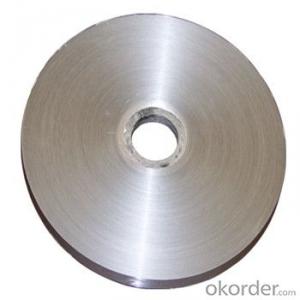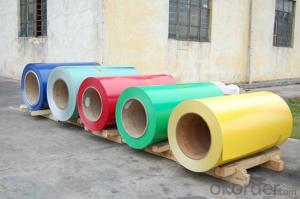Black Aluminum Coil Stock for Color Coated Curtain Walls
- Loading Port:
- Shanghai
- Payment Terms:
- TT OR LC
- Min Order Qty:
- 5 m.t.
- Supply Capability:
- 10000 m.t./month
OKorder Service Pledge
OKorder Financial Service
You Might Also Like
Specification
1. Specification of Color Coated Aluminum Coil for Curtain Walls
characteristics | Application |
1) Super peeling strength | 1) Building exterior curtain walls |
2) Excellent surface flatness and smoothness | 2) Decoration and renovation additions for old buildings |
3) Superior weather, corrosion, pollutant resistance | 3) Decoration of interior walls, ceilings, bathrooms, kitchens and balconies |
4) Even coating, various colors | 4) Shop door decorations |
5) Fireproof, excellent heat and sound insulation | 5) Advertisement board display platforms and signboards |
6) Superior impact resistance | 6) Wallboards and ceilings for tunnels |
7) Lightweight and easy to process | 7) Industrial materials, materials for vehicles and boats |
2. Application of Color Coated Aluminum Coil for Curtain Walls
(1).Interior: wall cladding, ceilings, bathrooms, kitchens and balconies, shutters, doors...
(2).Exterior: wall cladding, facades, roofing, canopies, tunnels, column covers , renovations...
(3).Advertisement: display platforms, signboards, fascia, shop fronts...
3. Feature of Color Coated Aluminum Coil for Curtain Walls
*Such coil is specially designed to replace aluminum ingot, due to the high export tax of aluminum ingot, the coil has better price than ingot.
*This type of coil can fit customer's remelting furnace just like ingot, no need to make any change to the production line that was previously used for ingot. The standard coil size and weight is very suitable for the feed gate of furnace.
*This type of coil causes less material wastage than ingot when remelted.
*Our coil is made directly from ore, no need to go though the ingot making process, quality is much better than other suppliers who use ingot scrap to make coil.
Be free from Oil Stain, Dent, Inclusion, Scratches, Stain, Oxide Dicoloration, Breaks, Corrosion, Roll Marks, Dirt Streaks and other defect which will interfere with use
4. Certificate:
SGS and ROHS(if client request, paid by client), MTC(plant provided), Certificate of Origin(FORM A, FORM E, CO), Bureau Veritas and SGS (if client request, paid by client), CIQS certificate
5. Image of Color Coated Aluminum Coil for Curtain Walls
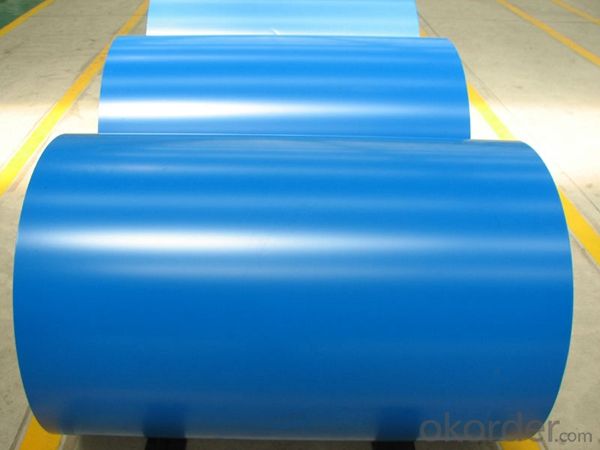
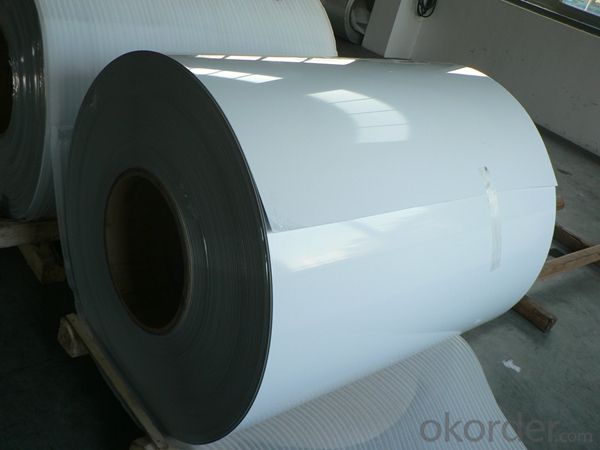
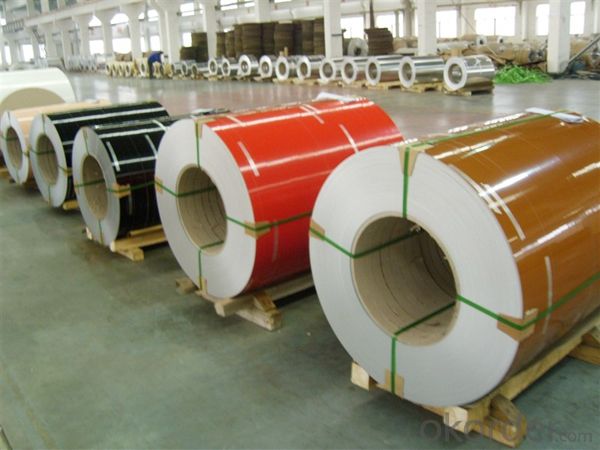
6. Package and shipping of Color Coated Aluminum Coil for Curtain Walls
eye to wall
eye to the wall
with wood pallet (wooded case also available)
7. FAQ
1) What is the delivery time?
Dpends on actual order, around 20 to 35 days
2)What is the QC system:
We have QC staff of 20 persons and advanced equipment, each production is with MTC traced from Aluminum ingot lot.
3) What market do you mainly sell to?
Australia, America, Asia, Middle East, Western Europe, Africa etc
- Q: What is the electrical conductivity of aluminum coils?
- The electrical conductivity of aluminum coils is relatively high. Aluminum is known for its good conductivity, with a conductivity rating of approximately 37.7 x 10^6 siemens per meter (S/m). This makes aluminum an excellent choice for various electrical applications, including the manufacturing of coils. The high conductivity of aluminum allows for efficient transmission of electric current through the coils, making them suitable for use in electrical wiring, transformers, motors, and other electrical equipment.
- Q: How are aluminum coils coated for color matching and aesthetic purposes?
- Aluminum coils are commonly coated for color matching and aesthetic purposes through a process known as coil coating. Coil coating is a continuous and highly automated process that involves applying a layer of paint or coating onto the aluminum coil surface. The first step in the coil coating process is cleaning the aluminum coil thoroughly to remove any dirt, grease, or oxidation. This is typically done using a combination of chemical cleaning agents and mechanical scrubbing methods to ensure a clean and smooth surface. After the cleaning process, a primer is applied to the aluminum coil. The primer acts as a bonding agent, improving the adhesion of the subsequent layers of paint or coating. The primer also helps to prevent corrosion on the aluminum surface. Once the primer is applied, the aluminum coil passes through a series of rollers, where the desired color coating is applied. This color coating can be achieved through various methods, such as coil coating, spray coating, or powder coating. Coil coating, being the most common method, involves the application of a liquid paint or coating onto the metal coil surface. The coating is then cured or dried using heat, ensuring proper adhesion and durability. To achieve color matching and aesthetic purposes, the paint or coating used is often customized to specific color palettes or customer requirements. This customization can be achieved by using a wide range of pigments and additives that alter the color, texture, and gloss level of the coating. Additionally, aluminum coils can also be coated with specialized coatings to enhance their aesthetic properties. For instance, there are coatings available that give the appearance of natural wood or stone, providing a more visually appealing finish. Overall, the process of coating aluminum coils for color matching and aesthetic purposes involves thorough cleaning, priming, and the application of customized paint or coatings. This ensures that the aluminum coils meet the desired aesthetics while also providing durability and protection against corrosion.
- Q: Are aluminum coils suitable for pharmaceutical packaging?
- Pharmaceutical packaging finds aluminum coils to be a fitting option. The pharmaceutical industry extensively utilizes aluminum due to its remarkable qualities of offering a barrier, durability, and flexibility. It effectively safeguards against moisture, light, oxygen, and other external elements that may compromise the quality and stability of pharmaceutical products. Aluminum coils allow for effortless molding into diverse shapes and sizes, making them ideal for packaging various pharmaceutical products like tablets, capsules, and ampoules. The packaging can be tailored to specific requirements, ensuring proper sealing and protection during storage and transportation. Moreover, aluminum is both non-toxic and chemically inert, guaranteeing that it does not react with the contents of the package. This is crucial for maintaining the medication's integrity and safety. Additionally, aluminum coils possess excellent heat conductivity, rendering them suitable for the commonly employed heat-sealing processes in pharmaceutical packaging. Apart from their functional properties, aluminum coils offer a sustainable and environmentally friendly choice for pharmaceutical packaging. They are easily recyclable, reducing the environmental impact and promoting sustainability within the healthcare industry. In summary, the barrier properties, flexibility, customization options, non-reactivity, heat conductivity, and sustainability of aluminum coils make them highly appropriate for pharmaceutical packaging.
- Q: Can aluminum coils be customized?
- Indeed, it is possible to customize aluminum coils to meet specific requirements. These coils possess remarkable versatility, as they can be tailored in terms of thickness, width, length, alloy composition, surface finish, and other specifications. Consequently, they find extensive utility across diverse industries, including construction, automotive, aerospace, electronics, and packaging. The customization of aluminum coils involves various processes, such as slitting, cutting-to-length, embossing, painting, and coating. This remarkable flexibility in customization empowers manufacturers to satisfy the distinct demands of their clientele, thereby ensuring that the aluminum coils are perfectly optimized for their intended applications.
- Q: I need to lay down two 3 welds on some 1/8 aluminum but my welder is not set up for it. could i just out fit my welder with aluminum wire without buying the spool gun and get the same results? or maybe I should just get a welding shop to do it for me?
- Hi. You need a spherical tip on, say, a mig welder to be successful when welding aluminum. Spreads out the heat better.
- Q: I would like to know because I'm getting a sword with an aluminum sheathe.
- That would depend on The Alloy and the Condition The alloy is the elements in percent that make up that material. The Condition is the heat treat of that alloy. Reffered to as Treatment when it comes to Aluminum Examples: 2024 T4 6061 T6 6063 T6 7075 T7 Etc,etc,etc,etc.................... Saying the word Aluminum is like saying the word Wood (Which One?) Aluminum can range from..what is this stuff,so soft and bends so easy To what the hell is this stuff, so dam hard stiff,and it just won't bend!! Oh,and 30 year boy........sit down.......30 years,and that is all you could come up with!!!! 30 years of drinking coffee,joking with the boss,and goofing off.You may want to sit the beer down and read up on the material you have been working with for 30 Years!!!!!
- Q: Is it possible to utilize an electric iron that features an aluminum coil heater?
- <p>Yes, you can use an electric iron with an aluminum coil heater. Aluminum coil heaters are commonly used in electric irons due to their excellent heat conductivity and quick heat-up time. They distribute heat evenly and maintain a consistent temperature, making them ideal for ironing. However, it's important to follow the manufacturer's guidelines for use and maintenance to ensure safety and longevity of the iron.</p>
- Q: How do aluminum coils compare to copper coils?
- Aluminum coils and copper coils are two common types of coils used in various applications, including heating, ventilation, and air conditioning (HVAC) systems. While both materials have their advantages and disadvantages, there are some key differences between aluminum coils and copper coils. One major difference is the cost. Aluminum is generally cheaper than copper, making aluminum coils a more cost-effective option for certain applications. However, it's important to note that the cost of copper has decreased in recent years, narrowing the price gap between the two materials. Another difference is the heat transfer efficiency. Copper is a better conductor of heat than aluminum, meaning that copper coils tend to have better heat transfer capabilities. This allows for more efficient cooling or heating, resulting in lower energy consumption and potentially lower operating costs. On the other hand, aluminum coils have a higher thermal expansion rate, which can lead to increased stress on the system over time. Durability is another factor to consider. Copper is known for its durability and resistance to corrosion, making copper coils more reliable and longer-lasting. Aluminum, on the other hand, is more susceptible to corrosion, especially in areas with high levels of humidity or exposure to saltwater. However, advancements in coating technologies have improved the corrosion resistance of aluminum coils, making them a viable option in many applications. Lastly, the weight of the coils is worth mentioning. Aluminum coils are significantly lighter than copper coils, which can make them easier to handle and install. This can be an advantage in situations where weight is a concern, such as in mobile or portable HVAC units. In summary, aluminum coils and copper coils have their own unique characteristics and advantages. Aluminum coils are generally more cost-effective and lighter but may have lower heat transfer efficiency and be more prone to corrosion. Copper coils, on the other hand, offer better heat transfer, enhanced durability, and resistance to corrosion. The choice between the two materials ultimately depends on the specific requirements and priorities of the application.
- Q: Why does the end face of aluminum coil have grease spots?
- The reason may be that the manufacturer hasn’t cleaned. Before being coated, the aluminum should be cleaned carefully. Otherwise the paint will peel off.
- Q: What are cold rolled aluminum coils and hot rolled aluminium coils, what are their respective features?
- Relatively hot rolling is the first to provide billets for cold rolling. Secondly, many materials require high corrosion resistance, fatigue resistance, plasticity and so on, which require hot rolling.
Send your message to us
Black Aluminum Coil Stock for Color Coated Curtain Walls
- Loading Port:
- Shanghai
- Payment Terms:
- TT OR LC
- Min Order Qty:
- 5 m.t.
- Supply Capability:
- 10000 m.t./month
OKorder Service Pledge
OKorder Financial Service
Similar products
Hot products
Hot Searches
Related keywords
